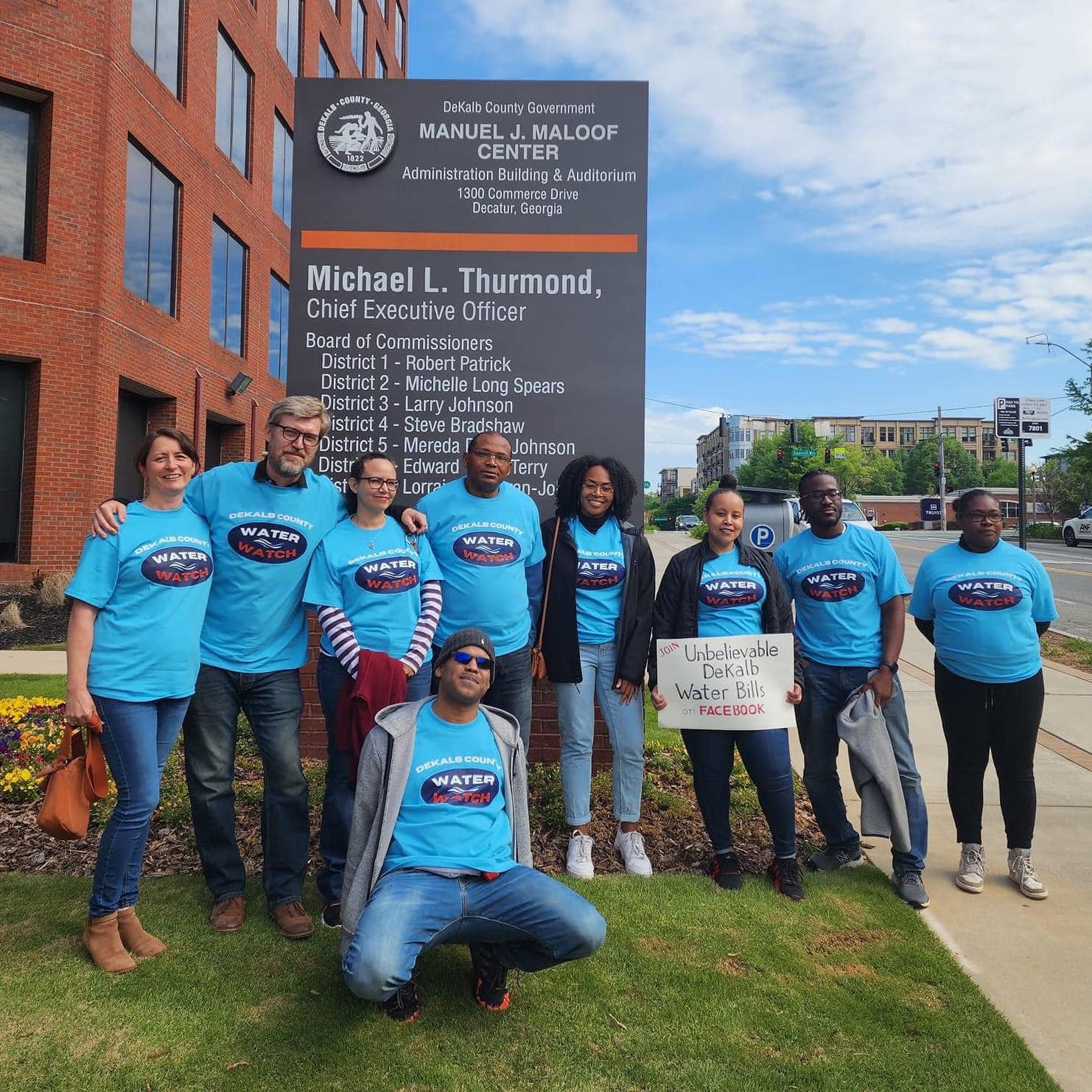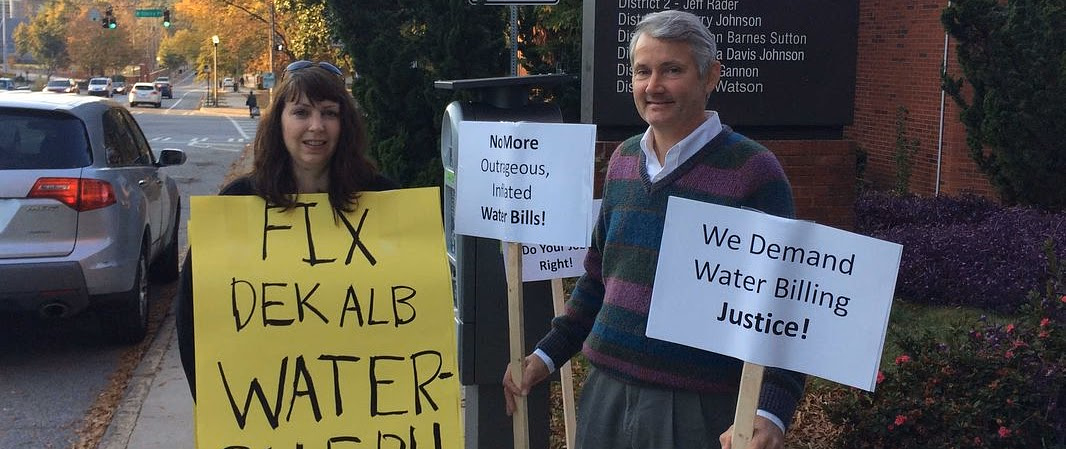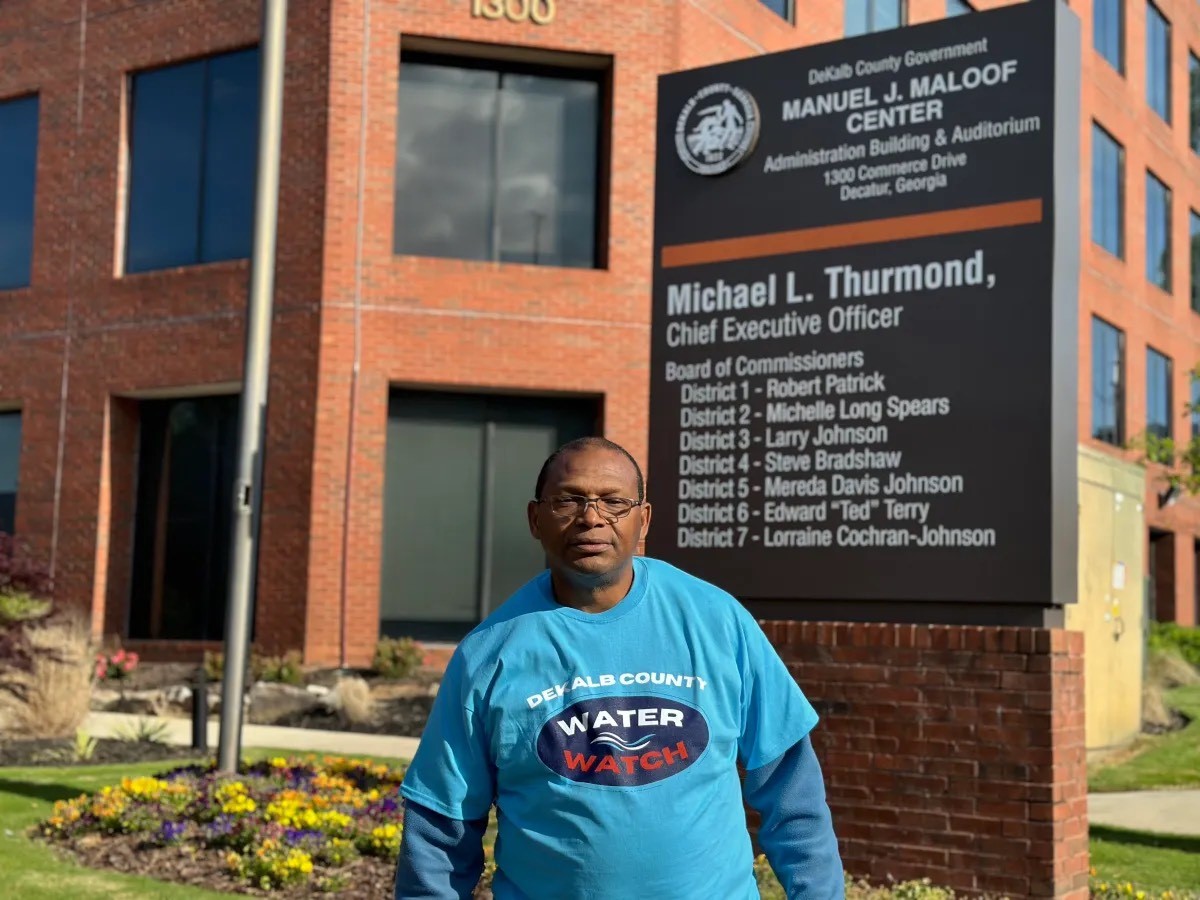
DeKalb County residents and AFSC staff. Photo: AFSC/Atlanta
The first time I talked with Cymeve Garrett—an entrepreneur and single mother in DeKalb County, Georgia—she was in tears. She had received an $80,000 water bill from the county for half of a rented duplex she had lived in for less than a year.
The outrageous debt began as a $1,000 bill that officials assured her would be adjusted after the Watershed Department twice failed to detect leaks on her property. But when a private contractor hired by Ms. Garrett’s landlord finally discovered and repaired a leak, officials levied the full charges on Ms. Garrett. Her landlord, who lived on the other side of the country, refused any responsibility.
In DeKalb County, sewer charges typically account for 85% of water bills, and county practice normally removes these charges from disputed bills. Yet even after this adjustment, officials still demanded Ms. Garrett pay $10,000.
At that time, Ms. Garrett was between jobs and a Section 8 voucher holder. She was also a new grandmother and caring for one of her own children at home. Despite this, the county issued Ms. Garrett a “payment plan” of $500 per month for her debt—an impossible amount for someone in her circumstances—or she would face disconnection. To make matters worse, while Ms. Garrett was frantically seeking solutions, the Watershed Department shut off her water earlier than the date they had provided, eliminating her ability to further dispute the bill.
Ms. Garrett is a survivor who has overcome many challenges in life. She was incredulous at the thought of a water bill threatening to break her spirit.
A countywide problem
Since 2016, thousands of DeKalb County residents like Ms. Garrett have received unbelievably high water bills—$500, $1,000, or even tens of thousands of dollars—with no explanation and no recourse.
Kay Park, a business owner in her 70s, has postponed her retirement until she can resolve a $250,000 water debt on a retail complex she owns. She wants to ensure the continued livelihood of her tenants, mostly immigrant small business owners who came to the U.S. for economic opportunity.
Santina DiCaro is a resident who receives disability benefits. She reached out to our coalition for assistance navigating the county’s byzantine dispute process for a $10,000 water bill involving, among other things, basic confusion over a neighbor’s meter and her own.
In South DeKalb—home to the county’s majority Black population—entire blocks of residents faced similar struggles.
But today, after years of pushing back, community members and organizations have secured a major victory toward ending this injustice. Last month, DeKalb County commissioners unanimously passed sweeping legislation to help ensure all residents have access to clean, affordable water. This win came after years of persistent organizing and advocacy efforts by the resident-led DeKalb Water Watch coalition, including local and national organizations like AFSC.
Systemic issues and racial disparities
For years, DeKalb County had failed to establish reasonable protocols for billing problems. Beyond their inability to properly diagnose leaks or investigate complaints, the only remedy officials offered residents were unrealistic payment plans. Regardless of their circumstances, residents could either accept the terms or face water disconnection.
The situation also revealed stark racial disparities in access to clean water. For years, DeKalb County has been under a consent decree with the EPA to repair sewer systems. As part of its plan to meet federal requirements, the county negotiated to divide the county into “priority” areas with repair deadlines and “non-priority” areas without firm deadlines. These so-called “non-priority” areas—located in South DeKalb County, home to Georgia’s largest Black population—also had the most damaged pipes and highest concentration of sewer spills. Meanwhile, the “priority areas” were located in predominantly white North Dekalb.
Analysis by the NAACP Legal Defense Fund (LDF) and subsequent, ongoing statistical analysis on water bills further confirmed years of complaints by residents about systemic inequity. The data irrefutably showed Black residents, lower-income residents, and people with disabilities were disproportionately affected by water shutoffs and unpayable bills.
Lithonia, for example, is a city in DeKalb with Georgia’s second-highest Black population and where residents’ annual median income is in the mid-$30,000s. LDF’s analysis revealed that residents there were spending anywhere from 6% to 11% of their income on water. That far exceeds the U.N.’s water affordability standard of 3% or less of a household’s income.

Community members protest exorbitant water bills in Atlanta. Photo: AFSC/Atlanta
Building a coalition
DeKalb Water Watch formed in 2016 when resident Star McKenzie created a Facebook group to connect community members trying to address water billing and affordability issues. When AFSC joined in 2023, we focused on strengthening and expanding the resident-led coalition and educating residents and DeKalb decision-makers about policy solutions.
Our coalition hosted information sessions for the community to share LDF’s disparate impact analysis and affordability research and to showcase successful affordability programs in other states, which became models for our own proposals in DeKalb. We accompanied residents—who have become friends over time—to public meetings where they testified about their billing issues and unfair treatment. We also connected residents with the media, who published stories supporting their accounts. Throughout this process, we’ve served as a bridge between residents and county officials, cultivating relationships based on accurate information and trust.
After years of organizing and advocacy, our collective efforts paid off. In February, the county approved legislation that:
- Caps water bills at 3% of income for low and extremely low-income residents.
- Creates a tiered discount program on water bills for lower-income residents.
- Establishes a Customer Advocate Office, which will cooperate with but operate independently from both the Finance and Water Departments for the fair handling of billing disputes.
- Creates an amnesty program for lower-income residents with water debt to receive debt forgiveness following a year of on-time payments.
What’s next
AFSC and coalition members are already hard at work collaborating with DeKalb officials to ensure proper implementation of this legislation. We attend bi-weekly meetings to collaborate with administrators on the creation of the Customer Advocate office. Once we are aligned with DeKalb decision-makers on the particulars of the legislation, we will collaborate with LDF to produce educational literature for the county to use in mailers to residents, and to be used in a series of upcoming information sessions—jointly hosted by our coalition and county officials—to educate residents about the new legislation and how they can qualify.
While we will continue advocating for sewer pipe repairs as outlined in the consent decree, and as they are additionally needed—in particular those in South DeKalb—this legislation means that the county will no longer be raising water revenue on the backs of the most marginalized residents.
Throughout this campaign, residents’ determination to find resolution and become subject matter experts in their own experiences—even amid difficult circumstances—has been the driving force behind our coalition’s success.
Change is possible when people organize and make their voices heard to defend their basic human rights. Now, in DeKalb County, thousands of residents’ right to access clean, affordable water is protected by the first comprehensive water affordability program in the Southeast. As advocates, we are working every day to give this program the strongest possible foundation for long-term success.
